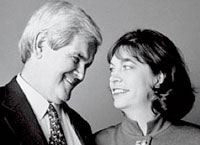
I recently read three lengthy political profiles which I want to recommend. Normally, the best political profiles appear in The New Yorker. But here are three in other publications.
Newt Gingrich
Newt Gingrich: The Indispensable Republican was written by John H. Richardson for the September 2010 edition of Esquire. The profile focuses a lot on Gingrich’s 3 marriages. Central to the profile is a lengthy interview with Gingrich’s second wife, Marianne (right), to whom he was married for 18 years before he took up with a new woman and eventually divorced Marianne.

All things considered, Marianne is surprisingly reasonable and non-bitter, though nonetheless quite frank. Richardson writes, “You might be inclined to think of what she says as the lament of an abandoned wife, but that would be a mistake. There is shockingly little bitterness in her, and she often speaks with great kindness of her former husband.”
Gingrich proposed to his second and third wives before he had asked for a divorce from his current wife. So Marianne experienced both sides. She says, “He asked me to marry him way too early. And he wasn’t divorced yet. I should have known there was a problem.” She says his proposal came within weeks of them meeting. “It’s not so much a compliment to me. It tells you a little bit about him.”
While his marriages are the continuing thread, the profile ranges way beyond that. We learn about Gingrich’s childhood, and about the insecurities which someone very close–like a wife–would see when Newt is out of the spotlight. We also come to understand, to an extent, why a man of Newt’s brilliance has been saying some really outrageous things (for which Joe Scarborough, on Politico, really took Gingrich to task). In several ways, we’re told that Newt doesn’t feel that his rhetoric must line up with his lifestyle, a fact supported by his attitude toward personal morality.
It’s quite an interesting profile, though Newt did not appreciate it.
Sarah Palin
Sarah Palin: The Sound and the Fury appeared in the October 2010 issue of Vanity Fair (which came out in September). Reporter Michael Gross, a self-proclaimed Christian, says he launched into the article with positive feelings toward Palin. But as he followed the story, talking to person after person who knew Palin, a different article emerged.
If you’re a Sarah Palin fan, you won’t like this article. You won’t want to accept what people say about the Sarah Palin they have seen, and the stories they tell behind-the-scenes. Unless you’re willing to accept that we peons constantly get hoodwinked by our political heroes. I’m one of those cynics who has believed in people’s public persona way too many times, and been severely disappointed. So I have no trouble accepting that at least some, maybe most, of this may be true.
However, I’m troubled by the over-use of anonymous sources in the article, people who would talk about Palin only if their names weren’t used. Gross acknowledges that this is a problem, that it damages the credibility of his article. Yet in the end, that’s what he had to go with. Sarah Palin, as he (and unnamed sources) continually point out, can be very vindictive and has a record of destroying people who oppose her. That’s why people preferred to stay off the record.
Gross spent months working on the article, and followed Palin through four states. He talked to lots of people in Alaska who know her (and who say she’s not the outdoorsman she pretends to be). He talked to people in the McCain presidential campaign, who had very few kind words about her and revealed some things I hadn’t heard before (like a Palin daughter who once told her, “You’re so fake. Why are you pretending to be something you’re not?”). Gross also delves deeply into all kinds of financial issues surrounding Palin. We learn about her explosive temper (which stays hidden from public view), her increasing isoloation in Wasilla, and the Bill-and-Hillary nature of her marriage.
Take the article with a grain of salt, or several grains. I did. I don’t like anonymous sources, and the portrait that emerges of Sarah Palin doesn’t always align with my gut reaction. But Gross is a responsible reporter, and I’ve taken the article under advisement. Plenty of negative stuff is said and written about Palin by detractors who have agendas (politicians and the MSNBC prime-time idiots), and I have no reason to trust what they say. But a good reporter like Michael Gross–I can’t write off everything he says. And there is a LOT in this lengthy, in-depth profile to chew on.
Glenn Beck
Being Glenn Beck, by Mark Leibovich, appeared in the September 29 edition of the New York Times. It’s mostly a positive, and somewhat light-hearted, profile of Beck. I found it enlightening, and have had to soften some of my disdain for this man, whose divisiveness I consider very bad for America. The article helped me understand some of his motivations, and that he shouldn’t be taken too seriously.
The article also sheds light on Beck’s sometimes rocky relationship with FoxNews and its other headliners. We learn that his show has an especially high female demographic, that he’s lost a lot of viewers, and that nearly 300 advertisers won’t promote their products on his show. It’s all interesting stuff and, as I said, presented in what I would consider a positive package.




 MSNBC is back on XM Satellite Radio, finally! I used to listen to it all the time going to work, when Don Imus hosted the morning show. Everybody who was anybody in politics clamored to be on his show. He made them put away the talking points and give honest opinions, and they complied (or were blacklisted by Imus). I loved it. It was the most enlightening, and fun, political show on TV or radio (though Imus constantly strayed over “the line”).
MSNBC is back on XM Satellite Radio, finally! I used to listen to it all the time going to work, when Don Imus hosted the morning show. Everybody who was anybody in politics clamored to be on his show. He made them put away the talking points and give honest opinions, and they complied (or were blacklisted by Imus). I loved it. It was the most enlightening, and fun, political show on TV or radio (though Imus constantly strayed over “the line”).


